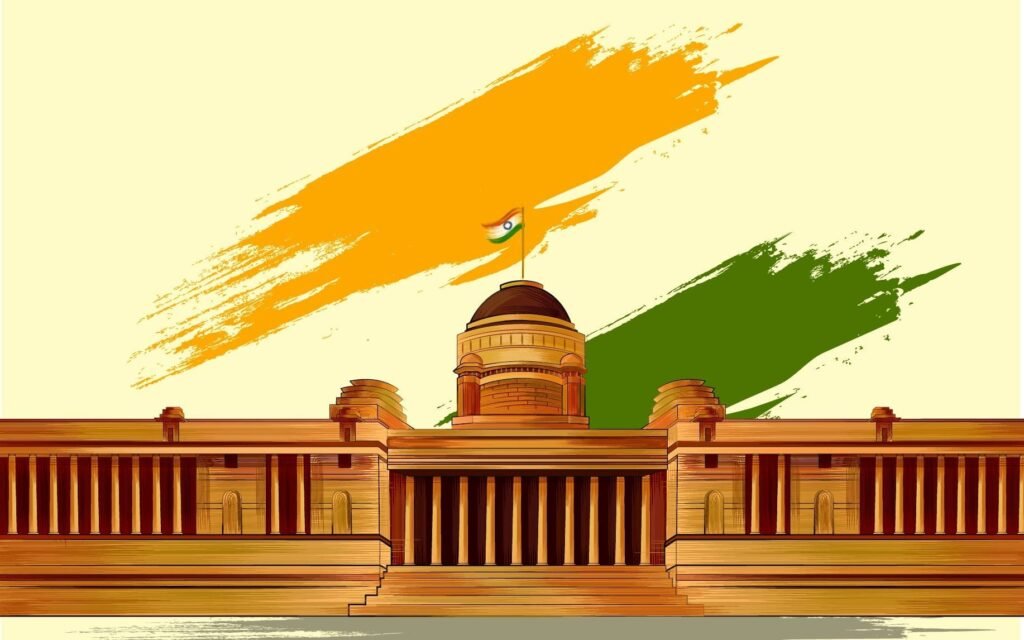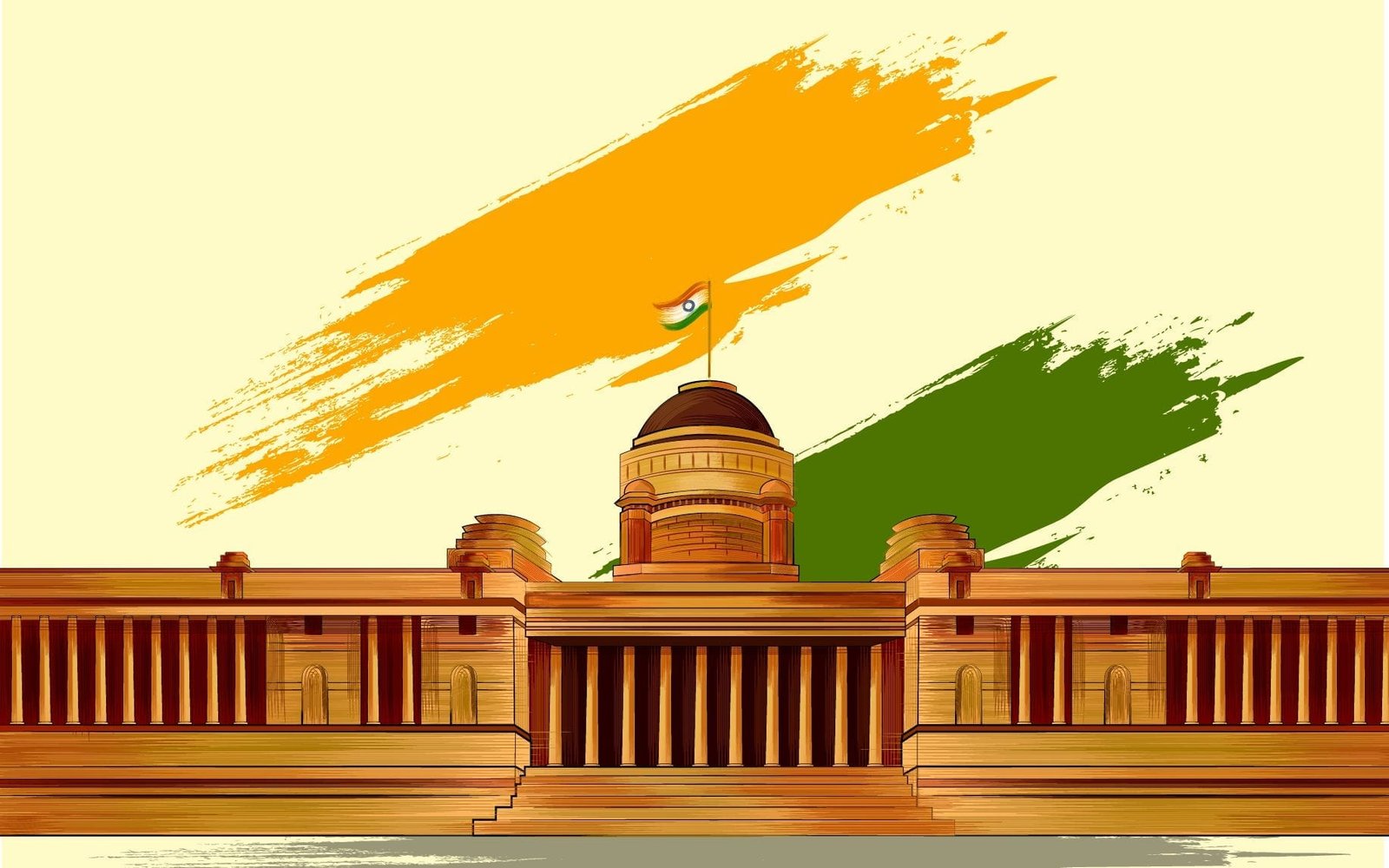
What is a Preamble ?
- A preamble is an introductory statement in a document that explains the document’s philosophy and objectives.
- In a Constitution, it presents the intention of its framers, the history behind its creation, and the core values and principles of the nation.
- The preamble basically gives idea of the following things/objects:
-
- Source of the Constitution
- Nature of Indian State
- Statement of its objectives
- Date of its adoption
History of the Preamble to Indian Constitution
- The ideals behind the Preamble to India’s Constitution were laid down by Jawaharlal Nehru’s Objectives Resolution, adopted by the Constituent Assembly on January 22, 1947.
- Although not enforceable in court, the Preamble states the objectives of the Constitution, and acts as an aid during the interpretation of Articles when language is found ambiguous.
Components of Preamble
- It is indicated by the Preamble that the source of authority of the Constitution lies with the people of India.
- Preamble declares India to be a sovereign, socialist, secular and democratic republic.
- The objectives stated by the Preamble are to secure justice, liberty, equality to all citizens and promote fraternity to maintain unity and integrity of the nation.
- The date is mentioned in the preamble when it was adopted i.e. November 26, 1949.
Key words in the Preamble
- We, the people of India: It indicates the ultimate sovereignty of the people of India. Sovereignty means the independent authority of the State, not being subject to the control of any other State or external power.
Sovereign
- It implies India is neither a dependency nor a dominion of any other nation but an independent state
- Membership of the commonwealth for India or UN membership does not diminish its sovereignty
Socialist
- The term was added through 42nd amendment act, 1976
- However, various provisions in the constitution existed that indicated the socialistic nature of our constitution. Ex: Directive Principles of State Policy (DPSP)
- The congress party adopted a resolution supporting socialism way back in 1955
- Indian style of socialism is a democratic socialism (both public and private enterprises is encouraged) as opposed to communist socialism (state decides everything under the sun concerning the distribution and usage of resources)
- Indian socialism is a blend of Marxist and Gandhian socialism, with heavy leanings towards the latter.
Secular
- The term was added through 42nd amendment act, 1976
- However, the Supreme Court said in 1974, although the ‘secular state’ was not expressly mentioned in the constitution, there can be no doubt that constitution-makers wanted to establish a secular state.
- This is evident when one considers the secular Fundamental provisions of our constitution. Ex: Right against discrimination based on religion, race, caste etc
Democratic
- Our constitution establishes a democracy based on popular sovereignty
- Our democracy is an indirect democracy where elected representatives take decision concerning the country. (The opposite of this happens to be direct democracy where citizens take decisions using tools such as- referendum, plebiscite, initiate and recall)
- Our democracy is based on representative parliamentary democracy under which the executive is responsible to the legislature
- The term democratic is used in the preamble in the broader sense embracing not only political democracy but also social and economic democracy
Republic
- India is democratic republic, meaning, its offices are open to every citizen of India unlike the UK where the highest office in the country is reserved for the monarchy
Objectives of the Indian Constitution
- The Constitution is the supreme law and it helps to maintain integrity in the society and to promote unity among the citizens to build a great nation.
- The main objective of the Indian Constitution is to promote harmony throughout the nation.
- The factors which help in achieving this objective are:
Justice
- It was borrowed from USSR constitution
- The ideal of justice in this case embraces three distinct forms- social, economical and political
- Social justice denotes the equal treatment of all citizens without any social discrimination
- Economic justice denotes the non-discrimination between people on the basis of economic factors
- A combination of social justice and economic justice denotes what is known as ‘distributive justice’
- Political justice means all citizens should have equal political rights, equal access to all political offices and equal voice in the government
There are three types of Justice
- Social Justice – Social justice means that the Constitution wants to create a society without discrimination on any grounds like caste, creed, gender, religion, etc.
- Economic Justice – Economic Justice means no discrimination can be caused by people on the basis of their wealth, income, and economic status. Every person must be paid equally for an equal position and all people must get opportunities to earn for their living.
- Political Justice – Political Justice means all the people have an equal, free and fair right without any discrimination to participate in political opportunities.
- Equality: The term ‘Equality’ means no section of society has any special privileges and all the people have given equal opportunities for everything without any discriminations. Everyone is equal before the law. This ideal was borrowed from French revolution
- Liberty: The term ‘Liberty’ means freedom for the people to choose their way of life, have political views and behavior in society. Liberty does not mean freedom to do anything, a person can do anything but in the limit set by the law. This ideal was borrowed from French revolution
- Fraternity: The term ‘Fraternity’ means a feeling of brotherhood and an emotional attachment with the country and all the people. Fraternity helps to promote dignity and unity in the nation. This ideal was borrowed from French revolution. The preamble declares that fraternity has to assure two things- the dignity of the individual and the unity and integrity of the nation. The word integrity was added through 42nd constitutional amendment act, 1976
Importance of Objectives: It provides a way of life. It includes fraternity, liberty, and equality as the notion of a happy life and which can not be taken from each other.
- Liberty cannot be divorced from equality, equality cannot be divorced from liberty. Nor can liberty and equality be divorced from fraternity.
- Without equality, liberty would produce the supremacy of the few over the many.
- Equality without liberty would kill individual initiative.
- Without fraternity, liberty would produce the supremacy of the few over the many.
- Without fraternity, liberty and equality could not become a natural course of things.
Status of Preamble
The preamble being part of the Constitution is discussed several times in the Supreme Court. It can be understood by reading the following two cases.
- Case 1 :- Berubari Case: It was used as a reference under Article 143(1) of the Constitution which was on the implementation of the Indo-Pakistan Agreement related to the Berubari Union and in exchanging the enclaves which were decided for consideration by the bench consisting of eight judges.Through the Berubari case the Court stated that ‘Preamble is the key to open the mind of the makers’ but it can not be considered as part of the Constitution. Therefore it is not enforceable in a court of law.
- Case 2 :- Kesavananda Bharati Case: In this case, for the first time, a bench of 13 judges was assembled to hear a writ petition. The Court held that:
-
- The Preamble of the Constitution will now be considered as part of the Constitution.
- The Preamble is not the supreme power or source of any restriction or prohibition but it plays an important role in the interpretation of statutes and provisions of the Constitution.
- So, it can be concluded that preamble is part of the introductory part of the Constitution.
Note :- In the 1995 case of Union Government Vs LIC of India also, the Supreme Court has once again held that Preamble is the integral part of the Constitution but is not directly enforceable in a court of justice in India.
Amendment of the Preamble :
- 42nd Amendment Act, 1976: After the judgment of the Kesavanand Bharati case, it was accepted that the preamble is part of the Constitution.
-
- As a part of the Constitution, preamble can be amended under Article 368 of the Constitution, but the basic structure of the preamble can not be amended.
- As of now, the preamble is only amended once through the 42nd Amendment Act, 1976.
- The term ‘Socialist’, ‘Secular’, and ‘Integrity’ were added to the preamble through 42nd Amendment Act, 1976.
-
- ‘Socialist’ and ‘Secular’ were added between ‘Sovereign’ and ‘Democratic’.
- ‘Unity of the Nation’ was changed to ‘Unity and Integrity of the Nation’.
|
Fact Article 394 of the Constitution states that Articles 5, 6, 7, 8, 9, 60, 324, 367, 379 and 394 came into force since the adoption of the Constitution on 26th November 1949 and the rest of the provisions on 26th January 1950. The concept of Liberty, Equality, and Fraternity in our Preamble was adopted from the French Motto of the French Revolution. |
Some statements by eminent personalities regarding the preamble of the Indian constitution
- ‘Identity card of the constitution’- NA Palkhivala
- ‘The preamble to our constitution expresses what we had thought or dreamt so long’- Sir Alladi Krishnaswamy Iyer
- ‘The horoscope of our constitution’- Dr KM Munshi
- ‘It is the soul of the constitution. It is a key to the constitution. It is a jewel set in the constitution. It is a proper yardstick with which one can measure the worth of the constitution’- Pandit Thakur Das Bhargava
- ‘Key-note of the constitution’- Sir Ernest Baker
‘Preamble is the soul of our constitution, which lays down the pattern of our political society. It contains a solemn resolve, which nothing but a revolution can alter’- Former Chief Justice of India, M Hidayatullah




